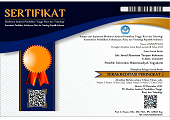Accounting Ethics: From Professionals Views
Abstract
Keywords
Full Text:
PDFReferences
Arfaoui, F., Damak-Ayadi, S., Ghram, R., & Bouchekoua, A. (2016). Ethics Education and Accounting Students' Level of Moral Development: Experimental Design in Tunisian Audit Context. Journal of Business Ethics, 138(1), 161–173. https://doi.org/10.1007/s10551-015-2643-z
Armstrong, M. B. (1987). Moral development and accounting education. Journal of Accounting Education, 5(1), 27–43. https://doi.org/https://doi.org/10.1016/0748-5751(87)90036-4
Blanthorne, C., Kovar, S., & Fisher, D. (2007). Accounting Educators' Opinions about Ethics in the Curriculum: An Extensive View. Issues in Accounting Education - Issues Account Educ, 22, 355–390. https://doi.org/10.2308/iace.2007.22.3.355
Brazel, J. F., Lucianetti, L., & Schaefer, T. J. (2021). Reporting Concerns About Earnings Quality: An Examination of Corporate Managers. Journal of Business Ethics, 171(3), 435–457. https://doi.org/10.1007/s10551-020-04436-1
Creswell, J. W. (2013). Qualitative inquiry and research design : choosing among five approaches (3rd ed.). Thousand Oaks, CA: SAGE Publications, Inc.
Dean, P. J. (1992). Making codes of ethics' real.' Journal of Business Ethics, 11(4), 285–290. https://doi.org/10.1007/BF00872170
Dichev, I. D., Graham, J. R., Harvey, C. R., & Rajgopal, S. (2013). Earnings quality: Evidence from the field. Journal of Accounting and Economics, 56(2, Supplement 1), 1–33. https://doi.org/https://doi.org/10.1016/j.jacceco.2013.05.004
Eynon, G., Hills, N. T., & Stevens, K. T. (1997). Factors that Influence the Moral Reasoning Abilities of Accountants: Implications for Universities and the Profession. Journal of Business Ethics, 16(12), 1297–1309. https://doi.org/10.1023/A:1005754201952
Fischer, J. (2005). Moral and ethical orientation: A meta-ethical sketch. Theologische Literaturzeitung, 130(5), 471–488. Retrieved from https://www.scopus.com/inward/record.uri?partnerID=HzOxMe3b&scp=61149236714&origin=inward
Fischer, M., & Rosenzweig, K. (1995). Attitudes of students and accounting practitioners concerning the ethical acceptability of earnings management. Journal of Business Ethics, 14, 433–444. https://doi.org/10.1007/BF00872085
Francis, J. J., Johnston, M., Robertson, C., Glidewell, L., Entwistle, V., Eccles, M. P., & Grimshaw, J. M. (2010). What is an adequate sample size? Operationalising data saturation for theory-based interview studies. Psychology & Health, 25(10), 1229–1245. https://doi.org/10.1080/08870440903194015
Gaa, J., & Thorne, L. (2004). An Introduction to the Special Issue on Professionalism and Ethics in Accounting Education. Issues in Accounting Education.
Ghaffari, F., Kyriacou, O., & Brennan, R. (2008). Exploring the Implementation of Ethics in U.K. Accounting Programs. Issues in Accounting Education - Issues Account Educ, 23, 183–198. https://doi.org/10.2308/iace.2008.23.2.183
Gowthorpe, C., & Amat, O. (2005). Creative Accounting: Some Ethical Issues of Macro- and Micro-Manipulation. Journal of Business Ethics, 57(1), 55–64. https://doi.org/10.1007/s10551-004-3822-5
Hartog, M., & Frame, P. (2004). Business Ethics in the Curriculum: Integrating Ethics through Work Experience. Journal of Business Ethics, 54(4), 399–409. https://doi.org/10.1007/s10551-004-1828-7
Hennink, M., Hutter, I., & Bailey, A. (2020). Qualitative Research Methods (2nd ed.). London: SAGE Publications Inc.
Jennings, M. (2004). Incorporating Ethics and Professionalism into Accounting Education and Research: A Discussion of the Voids and Advocacy for Training in Seminal Works in Business Ethics. Issues in Accounting Education - Issues Account Educ, 19, 7–26. https://doi.org/10.2308/iace.2004.19.1.7
Jooste, L. (2013). Investigating ethical perceptions of short‐term earnings management practices. International Journal of Emerging Markets, 8(3), 282–299. https://doi.org/10.1108/17468801311330338
Koh, H. P., Scully, G., & Woodliff, D. R. (2018). Can Anticipating Time Pressure Reduce the Likelihood of Unethical Behaviour Occurring? Journal of Business Ethics, 153(1), 197–213. https://doi.org/10.1007/s10551-016-3352-y
Kohlberg, L. (1971). Stages of Moral Development. Moral Education.
Langenderfer, H. Q., & Rockness, W. J. (1989). Integrating Ethics into the Accounting Curriculum : Issues, Problems, and Solutions. Issues in Accounting Education, 4, 58–69.
Lockwood, A. L. (1978). The Effects of Values Clarification and Moral Development Curricula on School-Age Subjects: A Critical Review of Recent Research. Review of Educational Research, 48(3), 325–364. https://doi.org/10.2307/1169949
O'Leary, C. (2012). Semester-specific ethical instruction for auditing students. Managerial Auditing Journal, 27(6), 598–619. https://doi.org/10.1108/02686901211236418
Onumah, J. M., Antwi-Gyamfi, N. Y., Djin, M., & Adomako, D. (2012). Ethics and Accounting Education in a Developing Country: Exploratory Evidence from the Premier University in Ghana. In V. Tauringana & M. Mangena (Eds.), Accounting in Africa: Vol. 12 Part A (pp. 127–154). https://doi.org/10.1108/S1479-3563(2012)000012A010
Ponemon, L. A. (1990). Ethical judgments in accounting: A cognitive-developmental perspective. Critical Perspectives on Accounting, 1(2), 191–215. https://doi.org/10.1016/1045-2354(90)02019-1
Rest, J. R. (1986). Moral development: Advances in research and theory. In Journal of Business Ethics. https://doi.org/10.1016/B978-0-12-385527-5.00001-2
Schwartz, M. S. (2002). A Code of Ethics for Corporate Code of Ethics. Journal of Business Ethics, 41(1), 27–43. https://doi.org/10.1023/A:1021393904930
Shaub, M. K. (1994). An analysis of the association of traditional demographic variables with the moral reasoning of auditing students and auditors. Journal of Accounting Education, 12(1), 1–26. https://doi.org/10.1016/0748-5751(94)90016-7
Staubus, G. J. (2005). Ethics failures in corporate financial reporting. Journal of Business Ethics, 57, 5–15. https://doi.org/10.1007/s10551-004-3811-8
Thorne, L. (2001). Refocusing ethics education in accounting: An examination of accounting students' tendency to use their cognitive moral capability. Journal of Accounting Education, 19(2), 103–117. https://doi.org/10.1016/S0748-5751(01)00014-8
Vladu, A. B., Amat, O., & Cuzdriorean, D. D. (2017). Truthfulness in Accounting: How to Discriminate Accounting Manipulators from Non-manipulators. Journal of Business Ethics, 140(4), 633–648. https://doi.org/10.1007/s10551-016-3048-3
Wotruba, T. R., Chonko, L. B., & Loe, T. W. (2001). The Impact of Ethics Code Familiarity on Manager Behavior. Journal of Business Ethics, 33(1), 59–69. https://doi.org/10.1023/A:1011925009588
Zahra, S. A. (1985). Background and work experience correlates of the ethics and effect of organizational politics. Journal of Business Ethics, 4(5), 419–423. https://doi.org/10.1007/BF02388597
DOI: https://doi.org/10.18196/jati.v6i2.18084
Refbacks
- There are currently no refbacks.
Copyright (c) 2023 Jati: Jurnal Akuntansi Terapan Indonesia

This work is licensed under a Creative Commons Attribution-NonCommercial 4.0 International License.
Jati: Jurnal Akuntansi Terapan Indonesia is indexed by :
Office:
Editorial of Jati UMY, Building D, Jl. Brawijaya, Tamantirto, Kasihan, Bantul, Yogyakarta.
Telp: (0274) 387656
Fax: (0274) 387646
WA: +62 858-3939-7548 (Puspita Dewi)
Email: jati@umy.ac.id
Based on a work at https://journal.umy.ac.id/index.php/jati/index

Jati : Jurnal Akuntansi Terapan Indonesia is licensed under a Creative Commons Attribution-NonCommercial 4.0 International License.

















